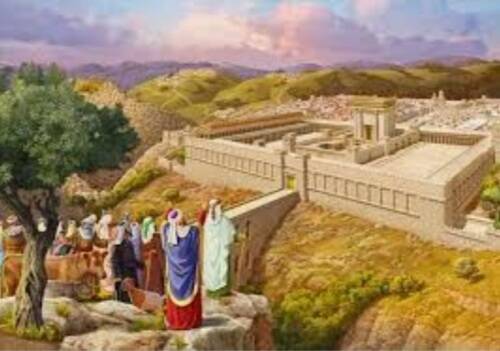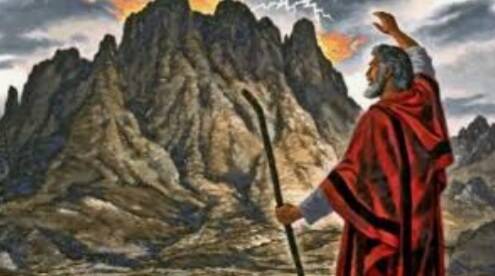Ruth was a moabite princess, who was not very happy with the idol- worship of her people.
It is strange when we read on Shavuos about this great women, and realizing she was not really a Jew by birth, but a Moabite princess. Maybe this is one of the most important lessons that we can learn from Ruth. Her genuine love for the Jewish people and the Torah, made her into one of the greatest Jewish women and ancester of Dovid HaMelech, and he in turn our redeemer.
But how did a Moabite princess of one of the not so friendly neighboring land of Israel, an example for Jewish women?
The story starts long before Ruth ever met a single Jewish person. As she became more and more disgusted with the idol- worship of her own people. Among all Gods they worshipped was Moloch, and in his honor young children were thrown into the fire, which was the lowest and the most cruel form of idol- worship. Ruth simply could not have mercy or find justice from this kind of idol- worship, and was in search for a new religion, something better and more truthful.
When the ten worst famines in history hits Israel, Elimelech, one of the most notalber of Judah camo to Moab. He hoped to find for him and his family a much better life there. It was then when Ruth became acquainted with this Jewish family and with their religion. Ruth was happy to marry one of their son's, eventhough this meant she had to give up the comforts of her royal position to join the Jewish family.
Meanwhile, things turned for the worse when HaShem punished Elimelech, for not staying with his own people back in Judah, to share their bad times,their sorrow and worries. Instead of helping them, he run away to Moab. Elimelech and his two son's died, which left Naomi a widow without children. She made the decission to go back to her homeland, where Elimelech owned some land. Naomi asked her two daughter in-laws, Orpah and Ruth if they wish to go with her to the poor en joyless life she had lead before. As it turned out , only Orpah, with some persuation, turned back to her own people. Ruth who became so convinced of the truth and beauty of Judaism, said that under no circumstances would she leave Naomi to return to rayal life, a life of idol- worship. Naomi coundn't persuade her, not even the argument that she had nothing to offer her, when Ruth replied to her
" Do not tell me to leave you, to return home from following you, I will go. And where you go, I go. And where you stay, I stay. Your people are my people. And your G-d, is my G-d. Where you die,I die and be buried. May G-d do so to me, and more also, only death will part us "
These are they words that touched those who have studied and appreaciated the truth and beauty of the Torah.
Ruth wasn't concerned about poverty and hunger, and together with Naomi she travelled to the land of her late husband, putting hope, faith and trust in HaShem. When Naomi and Ruth arrived in Beth Lechem, in Judah, where Elimelech came from, it was at the harvest. The famine had passed, and the fruit was growing again. Elimelech's possession's had been taken over by some family members, and it would take some time to regain them and sell them. As Naomi and Ruth had nothing to eat and it would had been natural to go out and get some food, after all it was her home and the people surely would help them. But the people were not not moved by the words of Naomi
" Call me no longer Naomi, which means sweet, but Mara " the bitter one", for HaShem has dealt very bitter with me "
Ruth went out in search of food and insisted Naomi to stay. She went into the fields, just like other poor people did, to pick up some barley what was left behind, or fallen to one side during cutting, they would not have forgotten about the poor. Ruth wasn't alone, for HaShem was with her. The owner of the field was none other than Boaz, the tenth of Judges of Israel.
Boaz a very wealthy and kind man, greeted Ruth in a friendly way. He also recognized that she wasn't a beggar and he ordered his workers to treat her with respect. Ruth got a great share of leket, pe'ah and shikchah to take home. Overjoyed she went back and showed Naomi the harvest. She also told Naomi about the friendliness of the owner of the fields, where she was in search of food. To her surprise, she learned that Boaz was a very close relative to her late husband, and the second in line as redeemer of Elimelech's properties. The redeemer was duty- bound to marry the widow of his kinsman.
Naomi adviced Ruth to visit Boaz and as she entrusted her fate abd the trust of her mother in-law in him. Boaz was very touched by the Ruth, with her modest and gentle manner and her fine character. He pointed out however, that not he, but another kinsman was first in line as redeemer of Elimelech's property, but he promised to do what he could and was ready to fulfill this obligation, when the other man would refuse. And this was exactly what happend, the man first in line, did not claim his rights, so that made Boaz not only redeemer of the estate but could also marry Ruth, this modest and great young woman, who gave up her royal life to convert to Judaism to live as a Jewess.
Boaz, who is a descended of prince Nachshon of the tribe of Judah, and the one who was the first to jump into the Red Sea, was the most important person of the Jewish of that time.
Boaz and Ruth married with children and Ruth was blessed and lived long enough to see her great- grandson Dovid to become king of Israel.




